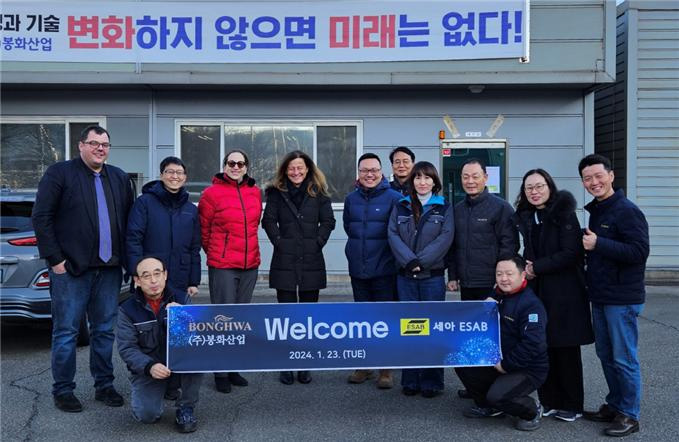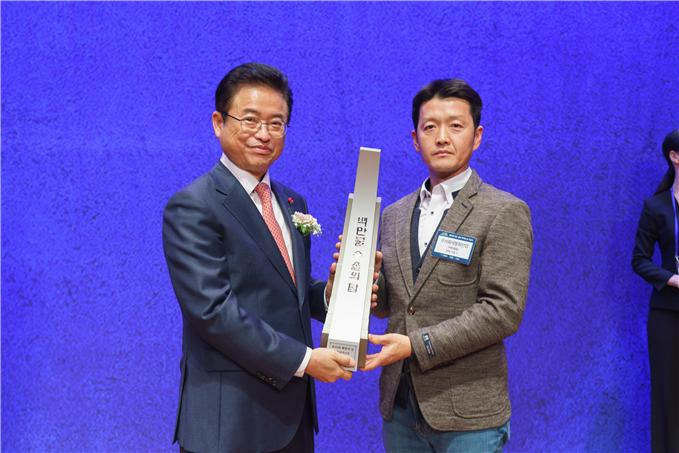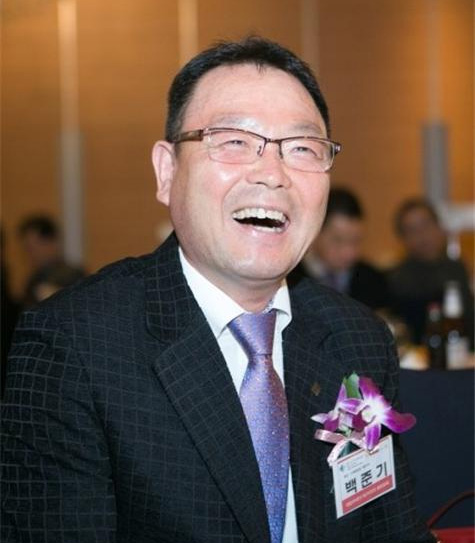[Trader of the Week] Baek Jun-gi, CEO of Bonghwa Industries
Page Info
Writer ADMIN Hit 7EA Date 24-11-30 21:27Content
[▲ Baek Jun-ki, CEO of Bonghwa Industry, succeeded in domestically producing welding powder, a product previously dominated by imports, and now exports to the US, Japan, and other countries. [Photo = Bonghwa Industry]]
An Accounting Professional's Perseverance Overtakes the Leading Country in Welding Powder
At one time, "replacing imported products" was a national mission. For a country with limited resources, self-reliance was absolutely crucial. The process was not easy. Japan, in particular, outperformed us in many areas.
However, there are entrepreneurs who have overcome these limitations. Baek Jun-ki, CEO of Bonghwa Industry, is one of them.
He is a perfectionist who knows no bounds. He never gives up. With his unwavering determination, he overtook Japan and Canada, the leading countries in the welding powder market, and dominated the domestic market. Now, he is penetrating advanced markets.
CEO Baek has accelerated his efforts to develop overseas markets, setting a goal of "50 billion won in exports and 100 billion won in sales within five years."
●Promotion from Accounting Manager to Factory Manager = CEO Baek graduated from a commercial high school. He joined a mid-sized textile machinery company and worked in accounting for 30 years. He quietly expanded his workload. Using "accounting" as a weapon, he pressured key departments. Using numbers, he demanded greater efficiency and lower costs.
CEO Baek said, "If you look at the financial statements, you can see the cash flow at a glance. Some people tried to do it manually, but I wouldn't tolerate that."
During his weekly report to the chairman, he would bluntly declare, "We can produce more" and "We can sell more." This was the booming textile industry of the 1980s. If you make something, it sells. It was a time for moderate work and moderate enjoyment.
Accounting was also a lot of work. Did he have the leisure to do it? CEO Baek said, "Accounting is about order. Order is established over time. From then on, I moved around to other departments."
His employees were not happy. He had particularly intense conflicts with his superiors. He failed to be promoted to executive for three consecutive years. CEO Baek described the situation, saying, "The chairman called me in and said, 'I'm trying to promote you to executive, but all the executives are against it.'"
Then, an opportunity arose. A vacancy arose for the position of plant manager in charge of production, and the chairman recommended CEO Baek, then the accounting manager, to the position at an executive meeting. He made the bombshell announcement, "It's urgent, so I'll give it a shot. If it doesn't work out, I'll find someone else." People recognized CEO Baek's sincerity.
CEO Baek, who also served as the accounting manager, demonstrated his talent for discovery as a plant manager. He improved upon the situation and secured his first major sales contract. In just a few years, he grew the company from 60-70 billion won in sales to 100 billion won.
●After leaving the company due to the IMF crisis, he developed powder = CEO Baek is either upright or not. In 1997, when a string of partner companies went bankrupt due to the foreign exchange crisis, the bank demanded that he, as the factory manager, jointly guarantee a 50 million won promissory note.
CEO Baek protested, "I can't agree." A bank official then contacted the company's chairman, who dismissed him, saying, "You're not part of our family."
After retiring, CEO Baek decided to start his own business. The results of his dedication to the company were disappointing. While considering new products, the raw materials import and sales market caught his eye. With the added benefit of foreign exchange gains, he could reap significant profits.
Leveraging his previous experience, he decided to supply ferroalloy powder to a welding rod manufacturer. This involved importing raw materials, processing them, and supplying them. The UK raw materials market prices made this a viable option. Approximately 80% of domestic powder was imported from Japan and Canada.
Using his 37 million won severance pay and a bank loan, he spent 85 million won to acquire a factory in Gimcheon, Gyeongbuk Province. It was a bargain, sold at a bargain price due to the IMF crisis.
●Experienced frustration = No sales for two years. Importing 20 tons of ore from the Netherlands and turning it into powder proved to be more challenging than expected.
CEO Baek said, "With the unwavering belief that 'we can do it,' I hired seven people and jumped in, but challenges piled up." After three years, they laid off all of their employees.
Then, they found an easy-to-develop product. They hired a retired welder and together, they developed a powder for coated welding rods (Fe-Si 45%). Three years after founding the company in 1998, they generated their first sales.
●Challenge to Localize Powder = Understanding Powder: This time, we tackled ferrochrome (FeCr). At the time, it was 100% imported. The development period, which was expected to take one to two years, ended up taking three.
CEO Baek confessed, "It wasn't easy to produce particles that exceeded the customer's desired standards. Even when the particles were produced, the equipment would break."
Nevertheless, we mastered the know-how and ultimately succeeded.
Ferrochrome is a profitable product for Bonghwa Industries. Demand surged immediately after its introduction, leading to sales of 6 billion won in 2009. It replaced powders from Japan and Canada.
CEO Baek wasn't satisfied. In 2009, he relocated to Goryeong, North Gyeongsang Province, securing a 3,000-pyeong (approximately 10,000 square meters) factory to expand beyond the domestic market and into the global market.
●Using Quality as a Weapon to Open the Chinese and US Markets = Let's Replace Imported Products in Korea One day in 2010, a Japanese company visited. They wanted to verify the quality. The quality was consistent, and the price was excellent. The Japanese company immediately decided to import.
CEO Baek said, "It must have been at least 10% cheaper than Japanese products."
We focused on expanding overseas, but it wasn't easy. Promoting our company and products was challenging.
CEO Baek said, "There was a global welding exhibition, but they wouldn't allow us to exhibit there."
While we were tapping overseas markets, we received a request for sample testing from China. They wanted to see our FeCR and FeSi powders, which are chromium compounds.
The results were positive. CEO Baek explained, "At that time, there were no products of our quality in China."
In 2021, we successfully entered the US market. We emailed the top three global welding rod manufacturers and requested sample tests, and orders came in.
After some time, five quality managers from an American company visited Bonghwa Industries in person to inspect the quality of the products and the condition of the production facilities. The results were "passed."
CEO Baek said, "After thoroughly inspecting the company, they praised it, saying, 'It's well-managed. It's excellent.'"
Afterwards, orders skyrocketed. Initially, annual exports were around 600 million won, but CEO Baek predicted that this year's figure would reach 2.6 to 2.7 billion won.

[▲A US importer visits Bonghwa Industries in Goryeong, Gyeongbuk, to take a commemorative photo before placing a large order. [Photo = Bonghwa Industries]]

[▲Bonghwa Industry received the Million Dollar Export Tower Award last year. [Photo = Bonghwa Industry]]
●Expecting to Exceed KRW 100 Billion in Sales in Five Years = Bonghwa Industry is the only company in Korea with integrated welding rod powder facilities. CEO Baek described the company as "Asia's best" in terms of integrated equipment.
Last year, sales reached KRW 27 billion, with exports accounting for approximately 15%. CEO Baek stated, "The domestic market is somewhat saturated, so now we need to expand overseas. We are aiming for KRW 50 billion in exports and KRW 100 billion in sales within five years."
Bonghwa Industry is also preparing to enter the secondary battery sector to expand sales.
Bonghwa Industry employs less than 25 people. However, its workforce is formidable.
CEO Baek stated, "Employee turnover is a significant loss for the company. We will create a family-friendly company where employees who have gained experience can continue to work together for a long time."
The company's name, "Bonghwa," comes from fires used as signal fires in the past. CEO Baek stated, "Like a beacon, we will continue to burn brightly and grow as a company."


 Family-Friendly Certified Company
Family-Friendly Certified Company Venture Company Certification
Venture Company Certification Selected as Star Company
Selected as Star Company ISO 9001
ISO 9001 ISO 14001
ISO 14001